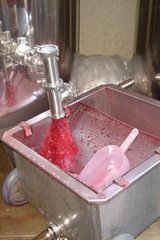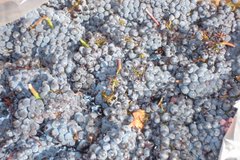
CHICAGO, Jan 19, 2009 (BUSINESS WIRE) -- Past legislative initiatives that have harmed Illinois consumers' access to wine have spurred a group of Illinois wine and free trade lovers to announce the formation of the Illinois Wine Consumer Coalition (IWCC). The Internet home of the IWCC can be found at http://www.illinoiswineconsumers.org.
The mission of the new consumer-advocacy group reads in part:
"The Illinois Wine Consumer Coalition and its members provide a voice for Illinois wine consumers. Our foundational principle is that Illinois consumers should have full access to the wines of their choice from both Illinois and out-of-state sources. A well-regulated and efficient wine market should provide full access to all wines for adult Illinois consumers."
PASSAGE OF ANTI-CONSUMER WINE BILL SPURS GROUP'S CREATION
"Our goal is to educate Illinois consumers, Illinois media and Illinois lawmakers on the issue of consumer access to wine and the benefits of free trade," said Gretchen Neuman, a member of the IWCC steering committee. "In addition, we will be working with other advocacy groups and growing our membership and our voice with the goal of giving Illinois consumers access to wines via direct shipping -- access that was stripped from Illinois consumers with the implementation of HB 429 in 2008."
Illinois wine consumers were stripped of their right to purchase wine from out-of-state wine retailers in 2008. The passage of HB 429 removed this right after Illinoisans had enjoyed full access to the American wine market for 15 years. The fact that consumers were never taken into account during deliberations over HB 429 helped give impetus to the creation of the IWCC.
"As a voice for Illinois consumers, we fully believe that wine sales should be well regulated and taxed," said Neuman. "However, this can easily be accomplished while still providing Illinoisans with full access to the American wine market."
WINE LOVERS ACROSS ILLINOIS INVITED TO ADD VOICES TO COALITION
"The recent restrictions on consumer access to wine in Illinois that resulted from HB 429 were clearly nothing more than payoff to the well-heeled Illinois alcohol distributors, the only group that benefits from restricting access to wine," said Neuman. "In the past five years Illinois alcohol distributors have given more than $3.5 million dollars in political contributions to help grease the wheel's of anti-consumer wine legislation."
Wine lovers and supporters of free trade across Illinois are invited to join the IWCC. As members they will get regular updates about the state of consumer access to wine in Illinois. In addition, the IWCC will encourage its membership to reach out to lawmakers, media and other wine consumers to assure they are very clear where Illinoisans stand when bills concerning wine and consumers are being considered in Springfield. Finally, the IWCC will be actively working to overturn the anti-consumer aspects of HB 429.
"Illinois wine consumers have been ignored and punished in the past and the principles of free trade shelved for the sake of special interests," said Neuman. "That won't happen again as long as the IWCC is watching and participating in the process."
For more information on the Illinois Wine Consumer Coalition visit http://www.illinoiswineconsumers.org.
Join the fan page on facebook too!
The mission of the new consumer-advocacy group reads in part:
"The Illinois Wine Consumer Coalition and its members provide a voice for Illinois wine consumers. Our foundational principle is that Illinois consumers should have full access to the wines of their choice from both Illinois and out-of-state sources. A well-regulated and efficient wine market should provide full access to all wines for adult Illinois consumers."
PASSAGE OF ANTI-CONSUMER WINE BILL SPURS GROUP'S CREATION
"Our goal is to educate Illinois consumers, Illinois media and Illinois lawmakers on the issue of consumer access to wine and the benefits of free trade," said Gretchen Neuman, a member of the IWCC steering committee. "In addition, we will be working with other advocacy groups and growing our membership and our voice with the goal of giving Illinois consumers access to wines via direct shipping -- access that was stripped from Illinois consumers with the implementation of HB 429 in 2008."
Illinois wine consumers were stripped of their right to purchase wine from out-of-state wine retailers in 2008. The passage of HB 429 removed this right after Illinoisans had enjoyed full access to the American wine market for 15 years. The fact that consumers were never taken into account during deliberations over HB 429 helped give impetus to the creation of the IWCC.
"As a voice for Illinois consumers, we fully believe that wine sales should be well regulated and taxed," said Neuman. "However, this can easily be accomplished while still providing Illinoisans with full access to the American wine market."
WINE LOVERS ACROSS ILLINOIS INVITED TO ADD VOICES TO COALITION
"The recent restrictions on consumer access to wine in Illinois that resulted from HB 429 were clearly nothing more than payoff to the well-heeled Illinois alcohol distributors, the only group that benefits from restricting access to wine," said Neuman. "In the past five years Illinois alcohol distributors have given more than $3.5 million dollars in political contributions to help grease the wheel's of anti-consumer wine legislation."
Wine lovers and supporters of free trade across Illinois are invited to join the IWCC. As members they will get regular updates about the state of consumer access to wine in Illinois. In addition, the IWCC will encourage its membership to reach out to lawmakers, media and other wine consumers to assure they are very clear where Illinoisans stand when bills concerning wine and consumers are being considered in Springfield. Finally, the IWCC will be actively working to overturn the anti-consumer aspects of HB 429.
"Illinois wine consumers have been ignored and punished in the past and the principles of free trade shelved for the sake of special interests," said Neuman. "That won't happen again as long as the IWCC is watching and participating in the process."
For more information on the Illinois Wine Consumer Coalition visit http://www.illinoiswineconsumers.org.
Join the fan page on facebook too!






